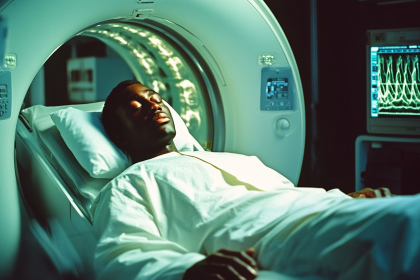Your doctor prescribed blood pressure medication to protect your heart, but what happens when the cure starts causing problems of its own? While these medications are lifesavers for millions of people, they can also produce side effects that range from annoying to downright dangerous.
The key is knowing which side effects you can manage and which ones require immediate medical attention. Ignoring serious warning signs could put you at risk for complications that are worse than the high blood pressure you’re trying to treat.
When dizziness becomes dangerous
Feeling lightheaded when you stand up is one of the most common side effects of blood pressure medications, especially when you first start taking them or increase your dose. This happens because the medication is doing its job — lowering your blood pressure — but sometimes it works too well.
Mild dizziness that lasts a few seconds is usually manageable. Stand up slowly, sit back down if you feel woozy, and give your body time to adjust to the medication over a few weeks.
But severe dizziness that causes you to nearly faint, affects your balance throughout the day, or happens even when you’re sitting down needs immediate attention. This could mean your dose is too high or the medication isn’t right for you.
Falls from medication-induced dizziness can cause serious injuries, especially in older adults. Don’t tough it out if the dizziness is affecting your daily activities or making you feel unsafe.
The persistent cough that won’t quit
ACE inhibitors, one of the most commonly prescribed blood pressure medications, cause a dry, hacking cough in about 10-15% of people who take them. This isn’t just any cough — it’s typically persistent, non-productive, and gets worse at night.
The cough develops because ACE inhibitors block an enzyme that breaks down a substance called bradykinin, which can irritate your airways. Some people develop this side effect within days, while others don’t experience it for months.
This cough rarely goes away on its own while you’re taking the medication. If it’s disrupting your sleep, affecting your work, or just driving you crazy, talk to your doctor about switching to a different type of blood pressure medication.
ARBs (angiotensin receptor blockers) work similarly to ACE inhibitors but rarely cause the persistent cough, making them a good alternative for many people.
Swelling that signals trouble
Some blood pressure medications, particularly calcium channel blockers, can cause swelling in your ankles, feet, or lower legs. This happens because the medication relaxes blood vessels, which can allow fluid to accumulate in tissues.
Mild ankle swelling that comes and goes might be manageable, especially if your blood pressure is well-controlled and you’re feeling good otherwise. Elevating your legs and reducing salt intake sometimes helps.
However, sudden or severe swelling, especially if it affects both legs equally, could indicate that your heart isn’t pumping effectively. This is particularly concerning if the swelling is accompanied by shortness of breath, rapid weight gain, or fatigue.
Swelling that extends up to your knees or higher, involves your hands or face, or develops quickly over a few days requires immediate medical evaluation.
Fatigue that steals your life
Beta blockers, commonly prescribed for high blood pressure, work by slowing down your heart rate and reducing the force of heart contractions. While this effectively lowers blood pressure, it can also make you feel tired, sluggish, or like you’re moving through molasses.
Some fatigue is normal when starting these medications, and many people adjust within a few weeks. But if you’re so tired that you can’t function normally, fall asleep during the day, or feel like you have no energy for activities you used to enjoy, the medication might not be right for you.
This type of fatigue can also mask symptoms of depression or other health problems, so it’s important to discuss persistent tiredness with your healthcare provider.
Sexual side effects nobody talks about
Many blood pressure medications can affect sexual function, but this side effect often gets overlooked or dismissed. Diuretics, beta blockers, and some other blood pressure drugs can reduce libido, cause erectile dysfunction in men, or make it difficult to reach orgasm.
These side effects can significantly impact quality of life and relationships, but they’re often reversible by switching medications or adjusting doses. Don’t suffer in silence — sexual health is an important part of overall wellness.
Your doctor has heard these concerns before and can work with you to find medications that control your blood pressure without destroying your sex life.
Blood sugar changes that sneak up on you
Some blood pressure medications, particularly certain beta blockers and diuretics, can affect blood sugar levels. Beta blockers might mask the warning signs of low blood sugar, while thiazide diuretics can raise blood glucose levels.
If you have diabetes or prediabetes, these effects can be particularly problematic. You might notice that your blood sugar readings are higher than usual, or if you take diabetes medication, you might experience low blood sugar episodes without the typical warning symptoms.
Monitor your blood sugar more closely when starting new blood pressure medications, and work with your healthcare team to adjust diabetes medications if needed.
Electrolyte imbalances that affect everything
Diuretics help lower blood pressure by removing excess fluid from your body, but they can also wash out important minerals like potassium, sodium, and magnesium. These electrolyte imbalances can cause serious problems.
Low potassium can cause muscle weakness, cramping, irregular heartbeats, and dangerous heart rhythm problems. Low sodium might cause confusion, weakness, or seizures. Magnesium deficiency can contribute to muscle cramps and heart rhythm issues.
Symptoms of electrolyte imbalances include muscle weakness, cramping, irregular heartbeat, confusion, or extreme fatigue. These require immediate medical attention and usually need blood tests to diagnose properly.
When to call your doctor immediately
Contact your healthcare provider right away if you experience chest pain, severe shortness of breath, fainting episodes, rapid or irregular heartbeat, severe swelling, signs of allergic reaction like rash or difficulty breathing, or persistent nausea and vomiting.
Don’t stop taking your blood pressure medication suddenly without medical supervision, as this can cause dangerous spikes in blood pressure. Instead, work with your doctor to find alternatives that control your blood pressure without causing intolerable side effects.
Finding the right balance
The goal of blood pressure treatment is to protect your cardiovascular health while maintaining your quality of life. With dozens of different medications available, there’s almost always a solution that works without causing major side effects.
Keep a symptom diary to track how you feel on different medications, and don’t hesitate to speak up about side effects. Your doctor needs this information to help you find the best treatment approach for your individual situation.
















